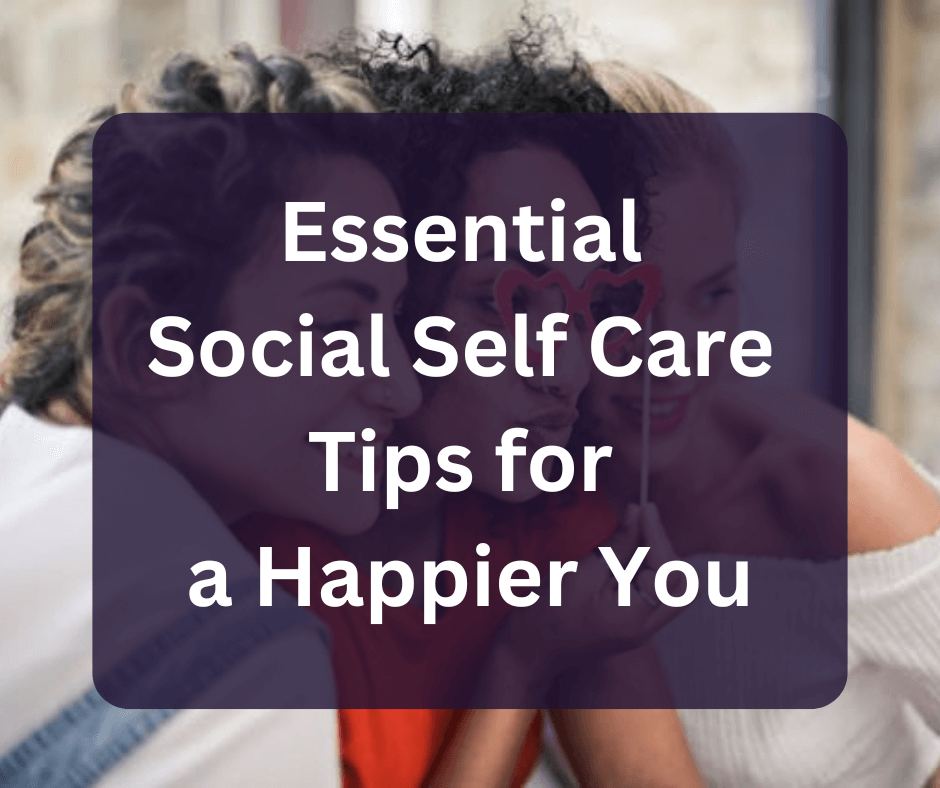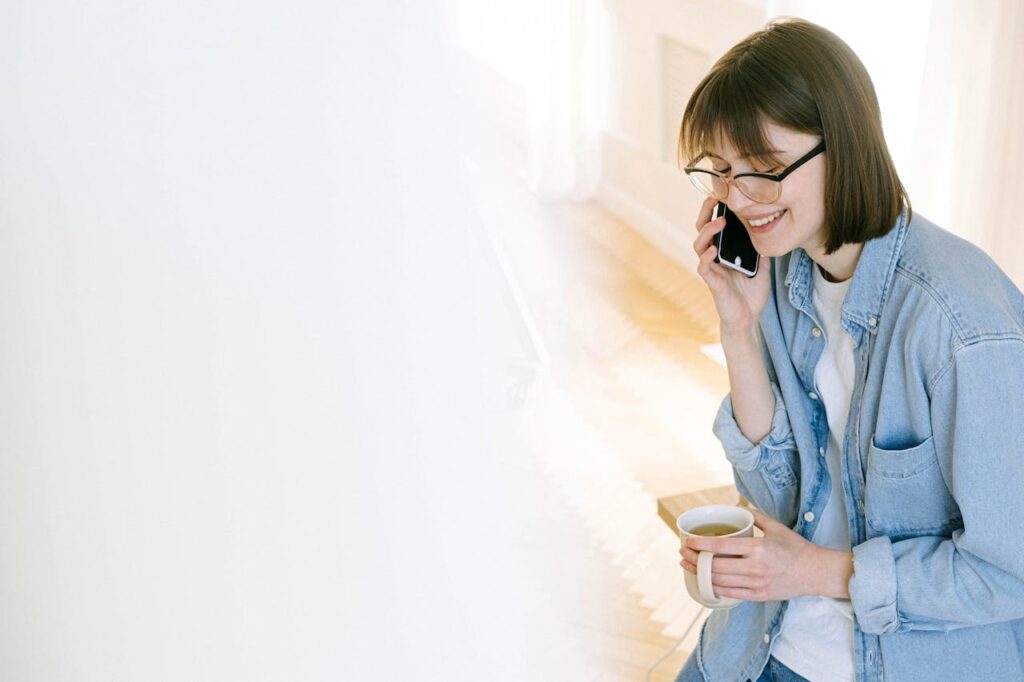Did you know that people with strong social connections have a 50% increased chance of longevity? Yet in our hyperconnected world, maintaining genuine relationships whilst protecting our emotional wellbeing can feel like walking a tightrope.

In this article, we will explore a few social self care tips to nurture our social connections without depleting our energy reserves. From setting healthy boundaries to cultivating meaningful interactions, these social self care strategies will help you create a more balanced and fulfilling social life.
Understanding Social Self Care and Why It Matters
Social self care is the practice of intentionally nurturing and maintaining social connections. It’s an essential component of self care and directly responsible for your overall wellbeing.
People with healthy social connections are less likely to suffer with mental illness, are better adjusted and tend to live longer on average. Social interactions are necessary for our mental health.
We developed in tribes, we depend on communities, we are social animals. Isolation can give you a sense of insecurity and exacerbate anxiety. So you need to have a strong support system and a feeling of belonging to feel safe and thrive.
Unfortunately, the demands of our modern lifestyle make it more and more difficult to create – or even maintain – strong, reliable relationships. We are always too busy, caught between endless responsibilities, which leave us no time to catch up with friends or engage in social activities.
Because social interaction is not an immediate need, we tend to overlook it.
Our time is divided between the efforts to put a roof over our heads and the need to look after our families. Our attention is caught by different social media platforms. We are so exhausted by the end of the day, that we decide to postpone social activities for later, when we feel we will have more time.

But this time never comes, as every day looks the same. And before you know it, your friendships are reduced to exchanging memes and empty conversations over instant messaging apps.
Investing attention and time in social self care is the best way to invest in your overall health and claim back control over your life.
Essential Social Self Care Tips for Everyday Life
So how do you make time for a social life when you already feel depleted with everyday challenges? Here are a few social self care tips you can apply to improve your relationships.
Create realistic social schedules that prevent burnout
We’ve all been there: we decided that we needed to make a change starting tomorrow, and then we went all in. This is how burnout happens. No matter how much you want to, or how good you think something is for you, you can’t implement a big change overnight. You can’t do it all. Nor should you.
If you didn’t have much of a social life, jumping into it every day and creating a demanding social schedule is not realistic. Try to implement changes gradually, while considering your other needs, as well as honouring your personal limitations.
I confess I definitely did this after I read about the negative effects of social isolation: I set up a draconian schedule, where I had to socialise daily. I put so much pressure on myself, that I was exhausted after only a week.
If you’re used to going out once a month, start by increasing it to twice a month. Socialising should be pleasant, not energy-draining. It’s also a good idea to do a life audit and see if there is something you do every day and doesn’t quite serve you.

Like if you watch Netflix and hour every day, it might be useful to replace one of those hours in the week for social self care. This way, you won’t feel like you are piling on another task into an already busy schedule.
Another thing is to know yourself. If you’re not the type of person who enjoys going to parties, you don’t have to go. There are other ways to socialise. You don’t have to exhaust yourself physically and mentally over something that doesn’t bring you any joy. Choose outdoor activities instead, like having a picnic, or going to outdoor yoga classes.
Master the art of saying ‘no’ without guilt
If you feel tired, or not up to it, feel free to say no. Many of us are afraid to refuse, because we think we might be perceived as rude. But in reality, people aren’t nearly as preoccupied with our actions as we seem to think. Most of the time, they just gloss over it. We are the ones beating ourselves up in the middle of the night over something that everybody else forgot a long time ago.
It’s also important to remember that you are the owner of your own time, and it’s your right to say no. Don’t worry, your friends will not get mad if you skip drinks one week because you aren’t feeling that social. And if they do, what kind of friends are they, anyway?
Learn to set and communicate personal boundaries
When it comes to social self care tips, one of the most overlooked is learning to communicate your boundaries. Social self care isn’t about being a social butterfly. It’s also about knowing when to tax that which is not serving you.
Setting personal boundaries is something that sounds scary, but once you get the hang of it, it’s actually quite easy. If you have that pesky friend who keeps calling late in the evening to vent about their day, find the right moment and ask them to stop.
When enforcing boundaries, the trick is to be able to give an alternative as well. For example:
“I understand that venting is important for you, and I want to be a good friend to you. But I don’t have the mental energy give you my full attention late in the evening. Should we do this Saturday morning over coffee instead?”
This way:
- you are limiting the unwanted behaviour to once a week instead of nightly,
- you are moving it to a time you are better equipped to deal with it in a healthy manner, and
- you are addressing and enforcing your boundaries.

Don’t worry, adults are able to deal with their own feelings. Disappointment and rejection are also part of healthy relationships, and we have all learnt to regulate them.
So by enforcing your boundaries, you are not causing a big catastrophe, and you will not lose any friends. You will just teach them to respect you, and encourage them to be more open and honest with you as well.
Building Meaningful Connections Through Self-Aware Socialising
Identify qualities of healthy relationships
Another essential aspect of social self care is being able to identify the difference between meaningful connections and unhealthy relationships. Not everyone you spend time with is a real friend.
Friendship is actually based on trust, empathy and respect. If any of these ingredients is missing, you should question the quality of that relationship and whether or not it is serving you. Since there is very little time and energy left in our day for a social life, you should make sure that at least the interactions you have are beneficial.
Trust is healthy in a friendship; manipulation is not
Open communication is healthy; gossip is not
Reciprocity is healthy; one-sided-ness is not
A sense of security within your relationship is healthy; fear of reprisal is not
Boundaries are healthy; self-serving behaviour is not
Disagreement is healthy; fights are not
Respect is healthy; disrespect is not
Support is healthy; undermining or ignoring the other person is not
Honest feedback is healthy; sycophantic behaviour is not
Accountability is healthy; dismissive excuses are not
Constructive criticism is healthy; mockery is not
Always learn to pause and ask yourself how you feel about a relationship, a conversation or someone’s behaviour towards you.
- Did it make you feel uncomfortable? And if so, why?
- Was their intention to help, or hinder you?
- Are their words coming form a place of love and respect, or form that of hurt?
- Are they helping you see your shortcomings, or are they lashing out?
Practise authentic communication
And while you’re at it, don’t forget to be just as critical towards yourself. Too often we fall into unhealthy patterns without realising it. We can display toxic behaviours as well. That’s why it’s so important to have real friends, who are able to hold you accountable.
Be open to criticism, real friends can be the mirror you need to see yourself from the outside, without the veil of excuses we all have.
Be honest and demand honesty in return.
Cultivate deeper connections with existing friends
If you feel like there’s no time to develop new friendships, you are right. Most adults are friends with the people they met in high school or university, and the reason is very simple: we had way more time back then.
Making new friends requires a lot of time spent together, earning trust, learning things about each other, creating memories together. When you work 12 hours a day, it’s a bit hard to find time for that.
But chances are, you already have a bunch of friends that you can reach out to. Regardless how superficial that relationship is, you can always go deeper.
Don’t be afraid to reach out to people you haven’t spoke with in a long time, even years. They will most likely be happy to hear from you. And I’m willing to bet the reason for the relationship coiling off is lack of time, a more demanding schedule and new priorities.

One of the best social self care tips out there is this: re-kindle those connections where the foundation is already set, reach out to those people where there already is common ground.
Only this time, try to be more open. Try to have deeper conversations, to establish a deeper connection with this person. Don’t worry about being misunderstood or judged. They are probably holding back for the same reason. When you show vulnerability, people usually respond in the same way.
Digital Detox and Social Media Boundaries
I mentioned earlier that social media is taking up a lot of our time, which we could be using for social self care. And our addiction to the digital world is worrying: did you know that the average person spends over 7 hours a day staring at screens?
The negative effects of excessive screen time have been well documented, so why not replace some of this screen time with social self care activities? Start tracking your app usage. Is there an app you are using more than 30 minutes a day? If the answer is yes, try to cut back on that.
A lot of social media apps have the option to set limits for yourself. Make use of this awesome feature, it’s your best friend in your digital detox journey. If you feel this isn’t enough, you can uninstall the app completely. You are less likely to spend hours on Instagram when the only way you can access it is via a laptop.
Create boundaries for online communication and be more mindful of online engagement. As absorbing as it might be, online socialising is not as rewarding as face-to-face interactions. Your online friends, while they serve a purpose, are not your real friends. Try to comment less, and go out in the real world more.
Check out this article for more ideas on creating a digital detox routine:
Nurturing Relationships Without Depleting Your Energy
One last thing: while cultivating relationships is essential for social self care, don’t forget to make time for yourself too. Alone time is also essential for our emotional wellbeing. Depending on how much of an introvert you are, you may require more or less. But don’t feel guilty for taking time off to recharge your batteries.
Find a good balance between alone time and social activities. Take the time to know yourself and understand your unique needs, and adapt your social self care routine to fit them.
There is no universal recipe, we are different and we all have different needs. Understand that knowing yourself is a process, that involves trial and error. Be patient and compassionate with yourself.
Conclusion
Remember, taking care of your social wellbeing doesn’t mean being available 24/7 or saying yes to every invitation. It’s about creating meaningful connections while honouring your own needs and boundaries.
Start implementing these social self care tips today, and watch how they transform both your relationships and your personal wellbeing.
Your social battery – and your friends – will thank you for it!

